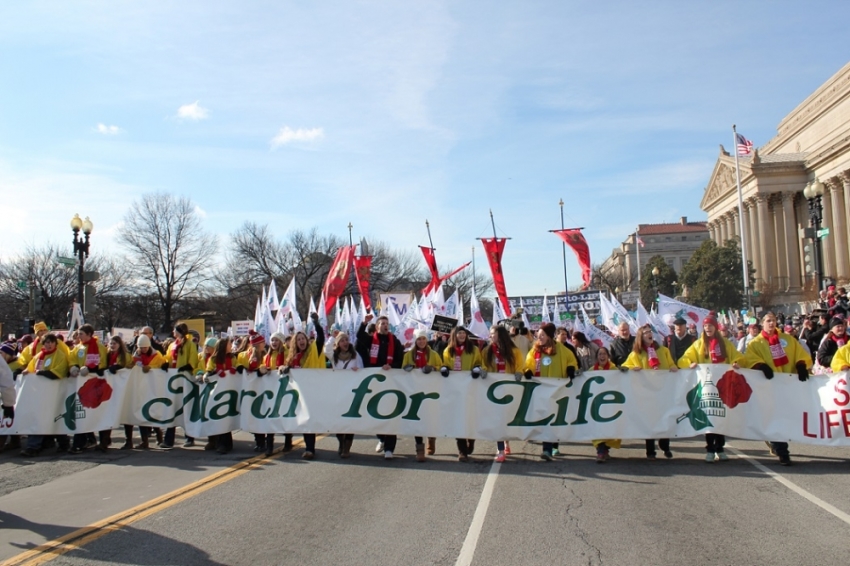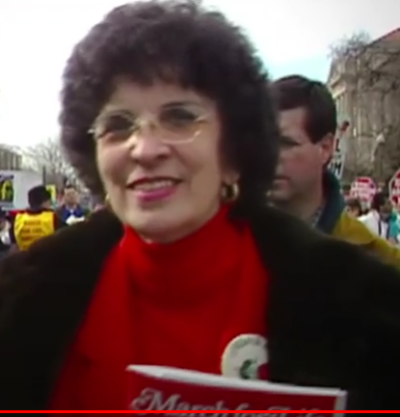Pres. Trump adds March for Life founder Nellie Gray to National Garden of Heroes

President Donald Trump plans to honor the pro-life activist who founded the annual March for Life in the National Garden of American Heroes, according to an executive order released Monday.
The president first announced his intention to create the National Garden in a July 3 speech at Mount Rushmore in South Dakota. As he explained at the time, the National Garden would be "a vast outdoor park that would honor the greatest Americans to ever live."
Trump's Mount Rushmore speech came on the same day that he authorized the construction of the National Garden via Executive Order 13934. He amended the Executive Order Monday by adding to the list of Americans he intends to honor in the National Garden. The amended list includes several former presidents, civil rights leaders, Founding Fathers, cultural icons and notable religious figures.

Nellie Gray, who founded the annual March for Life, is among the Americans the president intends to honor in the National Garden. Gray also served as president of the March for Life until she died in 2012 at the age of 88.
Gray and other pro-life activists spearheaded the first March for Life in 1974, which took place on the first anniversary of Roe v. Wade, as a "one-time march around the U.S. Capitol, which drew around 20,000 people." Gray hoped that the march would convince the Supreme Court and Congress to establish policies that protected the right to life.
After it became clear that the 1973 Supreme Court decision declaring abortion a constitutional right would not be overturned anytime soon, Gray quit her job and established the March for Life as a nonprofit, non-sectarian organization "committed to a culture of life." In the years following the founding of the March for Life, a march has taken place in Washington, D.C., every year in January, around the Jan. 22 anniversary of Roe v. Wade.
Several pro-life activists, including many associated with the March for Life, reflected on Gray's life in a tribute video that was published shortly after her death and aired at the 2013 March for Life.
"Nellie said that 'you cannot allow a little bit of abortion any more than you can allow a little bit of murder,'" recalled Valerian Stasik, who was a member of the March for Life's Board at the time.
"She was a tireless advocate for the unborn child throughout her life," said Paige Comstock Cunningham of the Center for Bio Ethics and Human Dignity. "No compromise, no exceptions."
Jeanne Mancini, who succeeded Gray as president of the March for Life shortly after her death, described her predecessor as "a truly principled woman" who "stuck to her principles, even if it meant great personal suffering in her life."
The tribute video featured footage of Gray speaking at the 34th annual March for Life in 2007, where she reflected on the March for Life's origin and long-term goal: "When we put this together, we thought there was going to be one march. Then we realized, Congress wasn't going to help and we better have a second march. ... What I am saying to you is we will be here until we overturn Roe v. Wade and believe me, we are going to overturn Roe v. Wade."
In 2020, Trump became the first president in American history to address the crowd in person. The president's supporters in the religious community as well as the pro-life movement frequently refer to him as the "most pro-life president in history."
Trump highlighted his accomplishments on behalf of the pro-life community in a proclamation designating Jan. 22 as National Sanctity of Human Life, specifically mentioning his efforts to prevent the use of taxpayer dollars to fund abortions at home and abroad as well as his appointment of more than 200 judges to the federal judiciary.
The 48th annual March for Life is scheduled to take place on Jan. 29. Because of the coronavirus pandemic and security concerns following the Jan. 6 Capitol riot, this year's March will largely take place virtually, with Mancini "asking all participants to stay home and to join the March virtually." However, "a small group of pro-life leaders from across the country" will march in Washington, D.C., this year.
According to Trump's July 3 executive order authorizing the establishment of the National Garden of American Heroes, "The National Garden should be opened for public access prior to the 250th anniversary of the proclamation of the Declaration of Independence on July 4, 2026." It remains unknown what impact the inauguration of Democrat Joe Biden as the 46th President of the United States, scheduled for Wednesday, will have on the future of the National Garden.



























